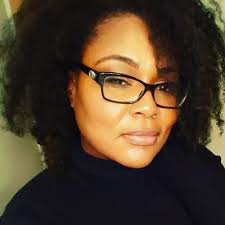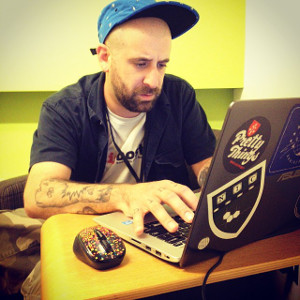“Somebody is going to put this on my tombstone one day that media literacy,” she says, “is just as important as, you know, being able to actually read.”
They say the best jokes are based on truth, and Hubbard’s wisecrack is no exception. For those sympathetic to her concerns about the decline of critical news analysis thanks to curated news feeds, the rapid destruction of print, digital disruption, and a combative White House, her attempt at morbid comedy may fall into the sometimes cringe-inducing category of “It’d be funny, if it weren’t so true.”
“I’m really concerned because we are as consumers—we’re taking information on face value at a time where we are living in a 24-hour news cycle,” says Hubbard, a prominent journalist and also an adjunct professor at Northampton Community College in Pennsylvania. “And that combination is really alarming.”
Hubbard’s apprehension comes as the internet has demonstrably transformed the news media landscape, and with that, the very method by which most Americans consume news. Still, the news media is in such a state of flux that even prominent digital outlets are shedding media jobs. Worse yet, there’s little indication that the bloodletting will cease any time soon.
While a considerable amount of cable news time is dedicated to President Donald Trump’s attacks on journalism and alleged Kremlin-backed social media influence operations in 2016, the threat posed by hedge fund-backed media companies like Digital First, deepening media consolidation, and the overall decay of local news, garners considerably less coverage. Of course, it’s not every journalist’s job to investigate their own industry, but the sustainability of the news media is among the pressing issues of our time given journalism’s oft-celebrated watchdog role.
The latest episode of dramatic newsroom cuts came a few weeks ago, when HuffPost, BuzzFeed, and Vice Media—three ambitious digital brands— collectively fired hundreds of journalists. (In HuffPost’s case, the cuts were instigated by its parent company, Verizon, which boasted a $197 million market value as of March 2018.) BuzzFeed lost 15 percent of its newsroom, just months after closing its podcasting department in a bid to bolster its video offerings. In all, more than 2,100 media professionals lost their jobs in the span of a week, including journalists at Gannett Company and McClatchy—two legacy publishers that combined own well over 100 newspapers.
And the hits just keep on coming. While America and its workforce is becoming more diverse, newsrooms appear to be going in the opposite direction. There’s also a credibility problem, as most Americans are also losing public trust in the institution. Certainly the latter is partly to blame on a barrage of attacks from a president who reflexively maligns unfavorable coverage as “fake news” and repeatedly distorts the truth. According to The Washington Post, President Trump has averaged 10 misleading or false claims a day since taking office in January 2017.
For the media, the last few years has been a whirlwind, punctuated by incessant attacks questioning the credibility of the professionals doing the hard work of reporting, verifying facts, and contextualizing issues for the masses. National reporters have vacillated between covering the alleged Russian conspiracy during the 2016 election, the administration’s corruption scandals, Trump’s tweets, countless Congressional hearings, and a fraught midterm election. The breakneck pace of the news cycle and reporting on the Special Counsel’s Russia probe has garnered criticism ranging from shoddy journalism to over-saturation and liberal media hysteria run amok.
The very public, and oftentimes malicious attacks on the media hardly encapsulates the entirety of the issues facing the industry. The nonprofit Freedom of the Press Foundation tracks physical attacks on journalists, arrests, and legal challenges in a public database. It noted that between 2017 and 2018 there were 88 cases of physical attacks and 27 subpoenas pressuring reporters to either divulge reporting materials and testify in court, or both.
If one were to ask journalists from all corners of the industry—from ink-stained mainstream broadsheets to social media savvy digital natives and beleaguered alternatives to resourceful independent reporters—to define the current state of journalism, you’d be hard-pressed to extract answers that were indistinguishable from one another.
For this special episode of News Beat podcast, we spoke with some of the most relevant journalists working today. Truthfully, our five guests would likely never appear on the same panel, yet their diversity of ideas and disparate approaches speak to the democratizing power of journalism—the ability to be the voice of the voiceless, regardless of pay grade, title, race or gender.
New(ish) Kids On The Block
Ben Smith’s modest office overlooks the digital media company’s news division. In contrast to its flamboyant social media personality and reputation for youthful exuberance, the newsroom is distinctly quiet, eerily so, with rows upon rows of reporters buried in their copy.
Smith, the editor in chief of BuzzFeed News, takes a seat next to the tripod used to record short segments of the outlet’s social media show, “AM2DM,” which the company reported in 2017 reached 1 million unique viewers a day. “AM2DM” is yet another way for the digital outlet to connect with its audience, even if that just means people who get their news from social media.
Actually, social media is the perfect place to begin when discussing BuzzFeed, or its news division, aptly named, BuzzFeed News.
“We were born very fully out of the social web, out of the 2011, 2012, somewhat utopian vision of [how] social media was going to change media first, and then, also journalism,” Smith tells News Beat podcast. “And obviously a lot has changed and evolved, but I think the core in our DNA is a sense that you can take the best values of traditional American, you know, fair, aggressive, independent reporting, and discard a lot of the forms and the mediums on which they printed in broadcast. And think about how do you do that kind of journalism the way that’s really native to these new media.”
Smith joined BuzzFeed in January in 2012. The former Politico columnist and politics blogger was instrumental in building BuzzFeed’s news division, including its investigative department, now led by Pulitzer Prize-winner Mark Schoofs.
The outlet was a Pulitzer finalist in both 2017 and 2018 and has made headlines with two high-profile and controversial Trump-Russia stories. The first was Smith’s decision to publish the so-called “Steele Dossier.” The 35-page memo, written by former British spy Christopher Steele, detailed a vast, yet still unproven, conspiracy between the Trump campaign and Russia. The memo even entered the realm of titillating tabloid fodder with sordid claims involving Russian prostitutes and Trump. The allegations—and BuzzFeed’s decision to release the memo after CNN reported that former FBI Director James Comey briefed President-Elect Trump about the dossier—has been the subject of much consternation from Trump and Republicans.
The second was a seemingly damning report that Trump directed Michael Cohen, his disgraced former personal attorney and consigliere, to lie to Congress about Trump’s plans for a Trump Tower in Moscow. The Special Counsel’s Office, which is investigating alleged Russian involvement in the 2016 election, issued a rare rebuke after the article was published, but didn’t elaborate on the purported inaccuracies.
In a Tweet (naturally), Smith responded: “We stand by our reporting and the sources who informed it, and we urge the Special Counsel to make clear what he’s disputing.”
News Beat’s interview with Smith was conducted well before the explosive Cohen story was published. But throughout the interview, Smith wasn’t shy about his newsroom’s journalistic ambitions.
“In this incredibly crowded media space where everyone is competing against everyone else all the time…the stuff that breaks through is often the biggest story, the story that has the most work in it, the story with the big revelations, the story that’s best crafted,” Smith told us. “And so, you know, you’re not just trying to do the best story for your publication that day. You’re trying to do the best story, you know, on the internet that week. And that’s a really high bar.”
“And so in that context,” he continued, “I think it often makes sense to invest a lot in huge stories, because investing half as much in a story that is half as good doesn’t get you half of the impact. It gets you one-hundredth.”
The Watchdog
On April 16, 2016, Margaret Sullivan wrote her final column as public editor of The New York Times. In some ways, the job was similar to the one she has now as media columnist for The Washington Post. There’s one big difference, however: The former required her to concentrate most of her efforts solely on the Times and, when the moment called for it, to be a conduit for its loyal readers.
WaPo offers a broader job description, allowing her to unleash criticisms and plaudits alike across an amorphous media landscape.
But it’s something she wrote in her last Times column that remains very true today.
“The old business model, based on print advertising and print subscriptions, is broken,” Sullivan wrote. “A new one—based on digital subscriptions, new advertising forms, and partnerships with other businesses and media platforms—is in the works. There are hopeful signs, high ambitions and lofty plans, but certainly no guarantee of success.
“All of this brings complications that have sometimes troubled the readers whose interests I advocated. Lines that were once clearly defined are more likely to be blurred.”
Sullivan is among the most respected media columnists in the industry. Some of her recent columns have her excoriating CNN for hiring a GOP operative with no journalism experience as a “politics editor,” speculating that sexist coverage of Hillary Clinton in 2016 will extend to the next presidential race, and lamenting Trump’s bewildering Oval Office speech on national television ostensibly to announce a national crisis at the border.
But there was one column, in particular, that underscores some of the most serious issues confronting the industry, titled “Cancel in protest? Or stay with a local newspaper that’s being strip-mined for profits?” In her public response to Jeffrey Miller, a faithful reader of the San Jose Mercury News, Sullivan urged him to continue supporting his hometown paper, despite misgivings that she acknowledged were well-founded.
The Mercury News is owned by Digital First Media, which Sullivan describes as “one of the worst villains in the decline of regional newspapers.” The hedge fund operates several other notable media properties, including The Denver Post, the city’s lone daily after the Rocky Mountain News’ demise a decade ago.
Miller complained that he felt like his subscription was helping pad the pockets of a hedge fund rather than “advancing journalism.” He talked about the overall decline of the paper, including its sports pages—a cherished sliver of real estate for many print newspaper subscribers.
Sullivan eventually concluded it was best for Miller to continue supporting the paper as a way of buttressing the beleaguered journalists behind the scenes.
There are likely many more Jeffrey Millers who feel a special attachment to their local newspaper but believe the product itself is lacking.
According to the nonprofit Pew Research Center, daily newspaper circulation is down 30 percent since its height in the 1980s, meaning less advertising revenue to channel into hiring new reporters or expanding coverage.
Not only are less people subscribing to local outlets, but there’s a growing number of communities that don’t even have a newspaper to support them. A University of North Carolina study found that 1,000 communities lost a newspaper between 2004 and 2017. This has helped spark a phenomenon often referred to as “news deserts”—neighborhoods devoid of a local news outlet—that has extended from traditionally neglected communities to more affluent areas throughout the United States.
Naturally, the shuttering of a local newspaper also leads to a less-informed electorate, according to studies. Not only that, but a forthcoming study found that government borrowing costs increased in areas where newspapers closed.
“Our evidence indicates that a lack of local newspaper coverage has serious financial consequences for local governments, and that alternative news sources are not necessarily filling the gaps,” the authors noted.
“When you lose that percentage of your newsroom staff, you can no longer cover everything you covered before,” said Sullivan, the former editor of The Buffalo News, which under her stewardship, boasted a 200-person newsroom.
“That’s a huge, troubling trend, and it’s not one that’s going to be reversed because of some very substantial issues, which have to do with the business model really being trashed, essentially by the internet and by the chain ownership, often by hedge funds, of newspapers,” she added. “So that’s really bad… Meanwhile, the news organizations that can focus on national politics or even global affairs, if they do it right, they can really prosper.”
Going Alt
Chris Faraone is the quintessential alt-journalist. The editor in chief and co-publisher of DigBoston and co-founder of the Boston Institute for Nonprofit Journalism (BINJ) had just moved Dig’s operation into new, well, digs, when we met him. Although the office was still unfurnished, it felt very much like home. After all, most altweekly reporters spend much of their time pounding the pavement, searching for stories that go underreported, often in underserved communities. For many of these journalists, the streets speak to them, whispering tales of misfortune, dreams incapacitated, and lives stalled.
While many altweeklies have suffered the same fate as their counterparts—declining readership and ad revenue—DigBoston is forging ahead with the oft-cited mission to amplify the voices of the marginalized and hold the powerful accountable.
Faraone says Dig is filling a void and pouncing on stories that are simply ignored by the much larger Boston Globe and other outlets.
“It’s a city where there’s always national press and there’s just a lot of media around here, but guess what? Nobody covers city hall,” says Farone. “Really. Even the Globe and the [Boston] Herald, they have people who do, but…it’s not like it used to be, where several reporters are stationed at city hall.”
Editors of alt-publications, often working on shoestring budgets, have to prudently decide where to commit their resources. While large daily papers may put out several hundred articles per week, these smaller outlets may publish several dozen, ranging from hard-hitting exposes, features about activists and those dedicated to their communities, and coverage of arts and entertainment.
When we sat with Faraone, he spoke about being judicious with Dig’s funds, and meticulously broke down how much a certain story would cost—from paying a freelancer to hiring a photographer and getting it in ink. One such story, he notes, required hundreds of hours of work. Reporters were compensated $500 each, and Faraone nearly had to pay one out of his own pocket.
Beyond informing the community, Faraone compared alternative newsweeklies to the “farm team” to a baseball franchise. These once vibrant institutions raised a crop of journalists, many of whom became legends in the field, among them, Wayne Barrett and Tom Robbins, both of the since-shuttered Village Voice. David Carr, the famed media columnist for The New York Times, who died suddenly in 2015, worked for several altweeklies and was the editor of The Washington City Paper before rising to prominence.
Faraone carries the vows of his blood-ink oath to truth-telling beyond the print and web pages of DigBoston, too. He co-founded BINJ, which launched in 2015, to further serve communities throughout the city and neighboring suburbs. BINJ contracts work to independent journalists who collaborate on large projects that are disseminated through various media organizations in the region. The work is funded through grants from various journalism foundations and donations.
Faraone, who was so committed to the cause that he tattooed “B-I-N-J” on his knuckles, compared it to a “free-floating incubator.”
“We are, in one sense, like a ‘Make A Wish Foundation’ for small community news outlets,” he says.
Of course, going alt doesn’t only mean covering the local community. Abby Martin, the former host of “Breaking The Set” on RT, has worked independently for years. She is the co-founder of Media Roots, which bills itself as “Reporting From Outside Party Lines.”
Martin’s against-the-grain coverage, which oftentimes shreds established narratives prevalent on mainstream or corporate media, is a breath of fresh air to many news consumers disenchanted with traditional journalism. Her reporting is a departure from so-called “false equivalencies” practiced in conventional media. Martin’s brand of journalism may not be for everyone, and she’s faced a torrent of vicious attacks, including rape and death threats.
“I’ll never forget that someone emailed me and said ‘Let’s put our raping shoes on and rape her,” she tells News Beat podcast. “And, you know, a lot of these people never got even their Instagram accounts taken down for saying these crazy things. So I have gotten so much rape, death threats, and also just harassment.”
That Martin faces such vitriol simply for practicing journalism underscores how charged the rhetoric nowadays is and how people on social media can flagrantly get away with blatant acts of harassment.
Yet, she continues on, fearless in her pursuit of a more honest reflection of current affairs and to correct the record on past injustices that have faded from history.
Martin’s work has taken her across the globe, from the Middle East to Latin America. Her most passionate work revolves around issues of social justice, civil liberties, turmoil in such countries as Venezuela, and the plight of Palestinians, all under the premise of American hegemony and its ever-expanding military footprint.
“I started off as an anti-war activist. I wouldn’t have really called myself political. In high school, I was just kind of generic and just ego-driven, like a typical suburban white American girl,” Martin says. “And it wasn’t until I went to San Diego State and really just kind of threw myself into studying sociology, political science, and really having kind of a crash course in U.S. imperialism, essentially the effects of what global capitalism has done to the rest of the world, especially in regards to militarism and how much the U.S. empire and its military offshoots just essentially eviscerated culture…and destroyed societies all over the world. So I was just stunned, to say the least.”
As for the current media landscape, Martin is quick to note how six companies control a whopping 90 percent of American media. This corporate stranglehold raises a litany of issues, including ensuring diversity in newsrooms, and whether certain news stories are suppressed.
That most news consumers are none the wiser to this news monopoly would not be surprising at all. It’s one of Martin’s goals to change that.
“I thought, wow, well, it doesn’t matter if my big issue is war and militarism. It doesn’t matter if your issue is food or animal rights,” says Martin. “If you don’t have a free and open media to tell these stories to, to get the information to people, it doesn’t matter what your issue is.”
That’s when she realized she could become citizen journalist and create “grassroots generated media content” reporting on “the most censored stories” and redirect the narrative.
After leaving RT, Martin co-founded The Empire Files, a widely viewed online outlet featuring documentaries and bootstrap reporting that also aired on teleSUR, which was founded more than a decade ago by the Venezuelan government and several other countries.
The United States’ recent economic sanctions against Venezuela, which started under the Obama administration but have escalated under Trump, prevented Martin from being paid, essentially cutting The Empire Files off, financially. The program formally shut down operations last August, yet Martin has established a GoFundMe campaign to continue its mission.
“We have all these shows and movies about how great journalists are and how important they are, but there’s zero funding for them, and the funding keeps dwindling more and more and more,” Martin says. “And they keep hammering in that you need to go to J-school, journalism school, and be this unbiased journalist if you want to be taken seriously, and it’s kind of this elitist institution, or at least it seems that way.
“I would much rather know where a journalist is coming from, in terms of their opinion, then to wade through neoliberal think-tank people from Brookings or Atlantic Council to try to figure out what the hell is really going on, and who they’re being paid for and what the agenda is.”













